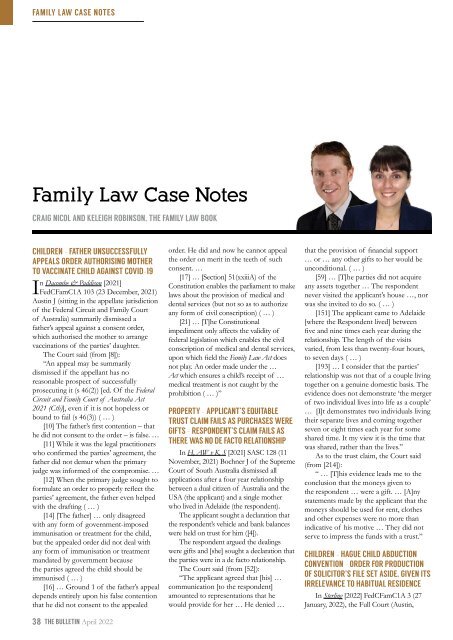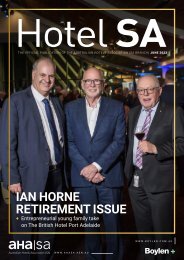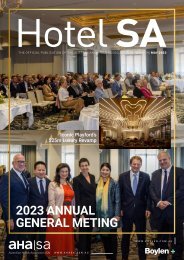LSB April 2022 LR
You also want an ePaper? Increase the reach of your titles
YUMPU automatically turns print PDFs into web optimized ePapers that Google loves.
FAMILY LAW CASE NOTES<br />
Family Law Case Notes<br />
CRAIG NICOL AND KELEIGH ROBINSON, THE FAMILY LAW BOOK<br />
CHILDREN – FATHER UNSUCCESSFULLY<br />
APPEALS ORDER AUTHORISING MOTHER<br />
TO VACCINATE CHILD AGAINST COVID-19<br />
In Dacombe & Paddison [2021]<br />
FedCFamC1A 103 (23 December, 2021)<br />
Austin J (sitting in the appellate jurisdiction<br />
of the Federal Circuit and Family Court<br />
of Australia) summarily dismissed a<br />
father’s appeal against a consent order,<br />
which authorised the mother to arrange<br />
vaccinations of the parties’ daughter.<br />
The Court said (from [8]):<br />
“An appeal may be summarily<br />
dismissed if the appellant has no<br />
reasonable prospect of successfully<br />
prosecuting it (s 46(2)) [ed. Of the Federal<br />
Circuit and Family Court of Australia Act<br />
2021 (Cth)], even if it is not hopeless or<br />
bound to fail (s 46(3)) ( … )<br />
[10] The father’s first contention – that<br />
he did not consent to the order – is false. …<br />
[11] While it was the legal practitioners<br />
who confirmed the parties’ agreement, the<br />
father did not demur when the primary<br />
judge was informed of the compromise. …<br />
[12] When the primary judge sought to<br />
formulate an order to properly reflect the<br />
parties’ agreement, the father even helped<br />
with the drafting ( … )<br />
[14] [The father] … only disagreed<br />
with any form of government-imposed<br />
immunisation or treatment for the child,<br />
but the appealed order did not deal with<br />
any form of immunisation or treatment<br />
mandated by government because<br />
the parties agreed the child should be<br />
immunised ( … )<br />
[16] … Ground 1 of the father’s appeal<br />
depends entirely upon his false contention<br />
that he did not consent to the appealed<br />
38 THE BULLETIN <strong>April</strong> <strong>2022</strong><br />
order. He did and now he cannot appeal<br />
the order on merit in the teeth of such<br />
consent. …<br />
[17] … [Section] 51(xxiiiA) of the<br />
Constitution enables the parliament to make<br />
laws about the provision of medical and<br />
dental services (but not so as to authorize<br />
any form of civil conscription) ( … )<br />
[21] … [T]he Constitutional<br />
impediment only affects the validity of<br />
federal legislation which enables the civil<br />
conscription of medical and dental services,<br />
upon which field the Family Law Act does<br />
not play. An order made under the …<br />
Act which ensures a child’s receipt of …<br />
medical treatment is not caught by the<br />
prohibition ( … )”<br />
PROPERTY – APPLICANT’S EQUITABLE<br />
TRUST CLAIM FAILS AS PURCHASES WERE<br />
GIFTS – RESPONDENT’S CLAIM FAILS AS<br />
THERE WAS NO DE FACTO RELATIONSHIP<br />
In H, AW v K, S [2021] SASC 128 (11<br />
November, 2021) Bochner J of the Supreme<br />
Court of South Australia dismissed all<br />
applications after a four year relationship<br />
between a dual citizen of Australia and the<br />
USA (the applicant) and a single mother<br />
who lived in Adelaide (the respondent).<br />
The applicant sought a declaration that<br />
the respondent’s vehicle and bank balances<br />
were held on trust for him ([4]).<br />
The respondent argued the dealings<br />
were gifts and [she] sought a declaration that<br />
the parties were in a de facto relationship.<br />
The Court said (from [52]):<br />
“The applicant agreed that [his] …<br />
communication [to the respondent]<br />
amounted to representations that he<br />
would provide for her … He denied …<br />
that the provision of financial support<br />
… or … any other gifts to her would be<br />
unconditional. ( … )<br />
[59] … [T]he parties did not acquire<br />
any assets together … The respondent<br />
never visited the applicant’s house …, nor<br />
was she invited to do so. ( … )<br />
[151] The applicant came to Adelaide<br />
[where the Respondent lived] between<br />
five and nine times each year during the<br />
relationship. The length of the visits<br />
varied, from less than twenty-four hours,<br />
to seven days ( … )<br />
[193] … I consider that the parties’<br />
relationship was not that of a couple living<br />
together on a genuine domestic basis. The<br />
evidence does not demonstrate ‘the merger<br />
of two individual lives into life as a couple’<br />
… [I]t demonstrates two individuals living<br />
their separate lives and coming together<br />
seven or eight times each year for some<br />
shared time. It my view it is the time that<br />
was shared, rather than the lives.”<br />
As to the trust claim, the Court said<br />
(from [214]):<br />
“ … [T]his evidence leads me to the<br />
conclusion that the moneys given to<br />
the respondent … were a gift. … [A]ny<br />
statements made by the applicant that the<br />
moneys should be used for rent, clothes<br />
and other expenses were no more than<br />
indicative of his motive … They did not<br />
serve to impress the funds with a trust.”<br />
CHILDREN – HAGUE CHILD ABDUCTION<br />
CONVENTION – ORDER FOR PRODUCTION<br />
OF SOLICITOR’S FILE SET ASIDE, GIVEN ITS<br />
IRRELEVANCE TO HABITUAL RESIDENCE<br />
In Sterling [<strong>2022</strong>] FedCFamC1A 3 (27<br />
January, <strong>2022</strong>), the Full Court (Austin,


















